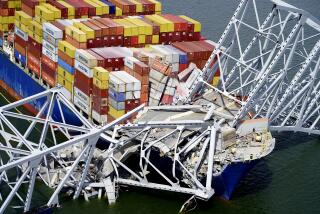Skipper Who Left Boat People Adrift Faces Court-Martial
- Share via
The former captain of the U. S. warship Dubuque, accused of leaving a large group of Vietnamese refugees packed on a disabled junk in the South China Sea, will be court-martialed, Navy officials in the Philippines announced Friday.
Capt. Alexander G. Balian, 48, the former skipper of the amphibious landing ship that was once based in San Diego, was relieved of his duties in August after details of the June 9 encounter emerged from statements made by some of the 52 survivors of the 37-day ordeal aboard the junk. In all, 58 refugees died during the voyage, and some of the others reportedly resorted to killing and cannibalism to survive.
Balian, a Los Angeles resident who is now stationed in Japan, will be court-martialed at the U. S. naval base at Subic Bay in the Philippines on seven counts of violating Navy orders and regulations for failing to rescue or adequately assist the refugees, according to official Navy documents and statements from a Navy spokesman.
Earlier, the Navy had said it was considering filing charges of negligent homicide against Balian, but no such charge has been filed.
A ‘Tragedy of Errors’
The veteran captain, who in statements to the Navy has described the incident as a “tragedy of errors,” has denied acting improperly and plans to fight the charges at the court-martial, according to his lawyer, Dan Donato Jr. of San Diego, himself a former Navy captain.
“It will be a contested trial,” Donato said Friday.
If convicted, Balian could be dismissed from the Navy, required to forfeit all his pay and allowances and imprisoned for two years on each count, or a maximum of 14 years.
As outlined in Navy documents, Balian’s previous statements, and interviews with the survivors conducted by The Times and United Nations officials, a group of 110 Vietnamese refugees boarded the junk May 22 in Ben Tre in southern Vietnam.
Within a few days, the boat’s engine broke down and no one on board could fix it. The boat had a sail, but no one knew how to sail. Soon food ran out, a problem compounded because none of the refugees knew how to fish in the ocean.
By the time the drifting junk encountered the Dubuque on June 9, 27 of the refugees had died either from illness or drowning as they tried to swim to passing ships. The Dubuque was on a tight schedule and heading to the Persian Gulf when Balian, surveying the ocean through binoculars, spotted the junk, its sail up but making only slight headway.
When the two boats came together for 90 minutes, they were midway between Vietnam and Palawan, the Philippines, and 280 nautical miles from land.
According to the description of events outlined in the court-martial documents, the 83 people on the junk, including at least one infant, were in dire need of help. Not only was the boat unseaworthy, but it was also “without medical supplies and sufficient food or water to sustain the Vietnamese people . . . who were in imminent danger of being lost at sea.”
Specifically, the Navy alleges that Balian failed to help one Vietnamese refugee who was in the water and attempting to reach the American military vessel but was drowning. The skipper also allegedly failed to help another refugee who swam toward the Dubuque and climbed a line hanging from the ship. The Navy claims crew members from the Dubuque shook the refugee off the line, leaving him alone in the water about 500 yards from the junk. The Navy also alleges that Balian ordered crew members not to throw life rings to refugees swimming in the water.
The Navy also alleges that Balian was negligent for failing to take several other actions, including: conducting a detailed inspection of the junk; determining the condition of the boat’s engine and making repairs; having Dubuque doctors and corpsmen examine the refugees even though they were “visibly dehydrated and sickly”; providing adequate amounts of food and water for the people on the junk, and giving clothes to naked refugees.
The counts against the former captain also state that he failed to send messages to his Navy superiors adequately describing the condition of the junk, the length of time the refugees had been at sea, the number of refugees who had died and “the number of bodies actually observed in the water in the vicinity” of the Dubuque and the refugees’ boat.
And, not only did the Dubuque not rescue the refugees, the Navy claims, but Balian also did not have a companion supply vessel that he controlled, the Kilaeua, stop and help.
Situation Was Chaotic
Balian’s version of events, contained in a lengthy statement he provided the Navy, describes the encounter as a “tragedy of errors.” He said the situation was chaotic and that problems were exacerbated because of inaccurate reports relayed to the bridge of the Dubuque and language difficulties caused by poor interpreting.
Balian also claims that a crew member who spoke Vietnamese promised the refugees, without his knowledge, that a second boat would arrive a few days later to help them.
The Dubuque supplied the refugees with 400 pounds of food and 50 gallons of water, Balian said.
The former captain said he was told the refugees had left Vietnam seven days before he encountered them, when in fact they had said that they had run out of food seven days earlier. In reality, they had been at sea for 18 days and had been drifting for 15 days because of the junk’s broken engine.
He also said he didn’t know that no one on the junk could sail or fish, or that people were sick and dying out of sight below deck.
“I have since discovered that a tragedy of errors resulted in the junk’s inability to reach land as I projected, and the felonious activity of killing and cannibalization of some of the refugees,” Balian said in his statement.
Would Have Acted Differently
“Had I had even an inkling that foul play might have ensued, or had the true facts been known to me, I am certain I would have made the decision to embark these refugees, as I had done on two prior occasions while in command of other ships,” he said.
After the Dubuque continued on to the Persian Gulf, the refugees, relying on the crew member’s promise, tried to stay in the area. But no help came, and the junk drifted 19 more days until the refugees were rescued by Philippine fishermen.
During those 19 days, however, some of the desperate refugees allegedly resorted to killing and cannibalism to stay alive, while as many as 50 boats passed them by.
Among those cannibalized were 12-year-old and 15-year-old boys who were slain and a 12-year-old girl who died, according to Navy sources and statements from refugees, who said that, in all, five people were eaten, four of whom were slain.
An initial Navy investigation into the incident--similar to a civilian grand jury probe--was completed in October. After reviewing those findings, Rear Adm. Roger L. Rich, commander of U. S. naval forces in the Philippines, officially signed the court-martial orders Thursday, according to a Navy spokesman.
Navy officials said the court-martial could begin as early as January. Donato, Balian’s lawyer, said Balian will travel to the Philippines for preliminary legal proceedings set to begin Monday.
The Dubuque, which was based in San Diego several years ago, is now based in Japan.
More to Read
Sign up for Essential California
The most important California stories and recommendations in your inbox every morning.
You may occasionally receive promotional content from the Los Angeles Times.













